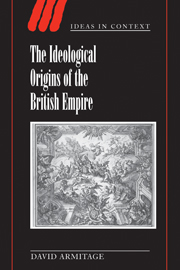Book contents
- Frontmatter
- Contents
- Acknowledgements
- 1 Introduction: state and empire in British history
- 2 The empire of Great Britain: England, Scotland and Ireland c. 1542–1612
- 3 Protestantismand empire: Hakluyt, Purchas and property
- 4 The empire of the seas, 1576–1689
- 5 Liberty and empire
- 6 The political economy of empire
- 7 Empire and ideology in the Walpolean era
- Bibliography
- Index
- Ideas in context
6 - The political economy of empire
Published online by Cambridge University Press: 06 July 2010
- Frontmatter
- Contents
- Acknowledgements
- 1 Introduction: state and empire in British history
- 2 The empire of Great Britain: England, Scotland and Ireland c. 1542–1612
- 3 Protestantismand empire: Hakluyt, Purchas and property
- 4 The empire of the seas, 1576–1689
- 5 Liberty and empire
- 6 The political economy of empire
- 7 Empire and ideology in the Walpolean era
- Bibliography
- Index
- Ideas in context
Summary
… the Theory of trade is a Princely Science, and the true Regulation of it the Key of Empire.
In the decades following the Stuart Restoration, it became increasingly clear that the dilemma classically formulated by Sallust and pointedly revived by Machiavelli was coming under challenge as a prescription for modern Europe and its overseas possessions. The growth of commerce marked a novel epoch in human affairs, in which the Roman and neo-Roman apprehension that liberty might be threatened by empire was less relevant, and less revealing, because the very definition of ‘empire’ itself was changing. The warnings of classical and modern republicans, in this regard at least, might be of only limited guidance to understanding contemporary politics. As Nicholas Barbon argued in 1690,
Livy, and those Antient Writers … have been very exact in describing the several forms of Military Discipline, but take no Notice of Trade; and Machiavel a Modern Writer, and the best, though he lived in a Government, where the Family of Medicis had advanced themselves to the Sovereignty by their Riches, acquired by Merchandizing, doth not mention Trade, as any way interested in the Affairs of State.
Writing fifty years later, David Hume agreed: ‘Trade was never esteemed an affair of state till the last century; and there is scarcely any ancient writer on politics, who has made mention of it. Even the ITALIANS have kept a profound silence with regard to it, though it has now engaged the chief attention, as well of ministers of state, as of speculative reasoners.’
- Type
- Chapter
- Information
- The Ideological Origins of the British Empire , pp. 146 - 169Publisher: Cambridge University PressPrint publication year: 2000



